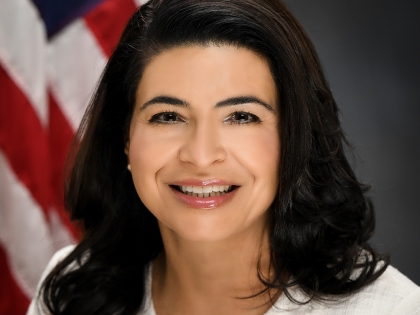
'Ghost guns' showing up in school shootings, experts fear trend will get worse

Since November, at least four school shootings had an alarming connection to law enforcement and activists alike; the suspected shooters used a "ghost gun."
A "ghost gun" is a firearm that comes packaged in parts, can be bought online and assembled without much of a trace, which experts warn are becoming increasingly dangerous.
"When we first heard about these weapons, we thought anyone can get them, even a kid. It's not a hypothetical anymore," Alex McCourt, an assistant professor with the Johns Hopkins Center for Gun Violence Prevention and Policy, told ABC News.
McCourt, law enforcement offices and other experts who have been studying the proliferation of "ghost guns" told ABC News this trend is likely to continue beyond the school setting unless policymakers take action.
There are two types of weapons that fall under the ghost gun moniker, according to McCourt.
The first is a plastic gun that can be made with a 3D printer and usually fires one bullet.
The second version, which he said has been increasingly found at crime scenes, is do-it-yourself gun assembly kits that include all the parts of a gun, but without serial numbers or specific components. McCourt said these homemade guns bypass federal laws requiring registration and tracing.
Due to loopholes in federal gun laws, the kits are not considered firearms because they are missing specific completed components. In addition, under current laws, users aren't allowed to register their constructed weapons with the federal government.
A spokeswoman for the U.S. Bureau of Alcohol, Tobacco, Firearms and Explosives told ABC News that the number of "privately made firearms" or PMF recovered from crime scenes by law enforcement has increased over the years. In 2016, law enforcement agencies across the country confiscated 1,750 PMFs from crime scenes, and the number jumped to 8,712 in 2020, according to the agency.
"From Jan. 1, 2016, through Dec. 31, 2020, there were approximately 23,906 suspected PMFs reported to ATF as having been recovered by law enforcement from potential crime scenes, including 325 homicides or attempted homicides," ATF spokeswoman Carolyn Gwathmey said in a statement.
Gwathmey said the data might be undercounted as not all law enforcement agencies have submitted their PMF and "ghost gun" numbers to the federal government.
Legal loopholes allow the "ghost gun" kits to be sold online, and all it takes is common house tools to construct in under half an hour, McCourt said.
"It's much less complicated than you might think," he said. "If you can put together IKEA furniture, you can assemble these weapons," he said.
Rob Wilcox, the federal legal director at Everytown for Gun Safety, a non-profit gun safety organization, told ABC News there are several online sites that not only sell the "ghost gun" kits but also provide step-by-step instructions to customers of any age without any oversight or background check. Wilcox said even though the federal government has limited data on these online marketplaces, his group's research has found that the number of Internet-based "ghost gun" retailers has been increasing over the years.
"You can ship it to a place where there is no watchful eye," he said.
The weapons have recently made their way into school grounds.
On Nov. 29, a 15-year-old student allegedly shot and wounded a 16-year-old classmate with a "ghost gun" at Cesar Chavez High School in Phoenix, according to the Phoenix Police Department. The investigation is ongoing, a police spokeswoman told ABC News.
Steven Alston Jr., a 17-year-old student at Magruder High School in Rockville, Maryland, allegedly shot and critically wounded a 15-year-old classmate on Jan. 21, during a dispute, police said. Investigators said Alston, who is being tried as an adult with attempted second-degree murder, allegedly used a "ghost gun."
"Three different parts were literally delivered to his home," Montgomery County Police Chief Marcus Jones told reporters at a news conference days after the shooting.
Albuquerque, New Mexico, police said on Feb. 25, 14-year-old Marcos Trejo shot his classmate outside West Mesa High School during a fight over a ghost gun. Trejo has been charged with murder, police said.
The most recent incident took place on March 4, when an 18-year-old suspect used a "ghost gun" to wound two teachers and a student at Olathe East High School in Kansas, according to prosecutors. Jaylon Desean Elmore has been charged with attempted capital murder, according to Johnson County District Attorney Steve Howe.
In all of the investigations, police and prosecutors told ABC News they are still looking into how the guns got into the hands of the teen suspects and have been warning about their spread in their communities.
A spokeswoman for the Montgomery County State's Attorney's Office, which is investigating the Magruder High School shooting, told ABC News in a statement that "ghost guns have been recovered from five county schools since the start of the school year."
Some states have taken legislative action against "ghost guns in light of these incidents."
Nine states, including New York and California, have responded to the growth of "ghost guns" with laws that regulate the sales of them by requiring background checks and serial numbers for all of the components in the kits, according to Everytown for Gun Safety.
New York state's "ghost gun" regulations went into effect this fall after legislators said it saw a 479% increase in "ghost gun" seizures across the state over the last three years.
""If you can't pass a background check to get a gun, then you shouldn't be able to get a gun--period," State Sen. Anna Kaplan, who introduced one of the New York bills, said in a statement last year.
Cities like Denver, San Francisco and Philadelphia have also adopted similar laws.
Some states are also considering similar legislation. For example, Maryland state lawmakers are debating a bill, SB 387, which would prohibit "a person from purchasing, receiving, selling, offering to sell, or transferring an unfinished frame or receiver."
During a hearing last month, law enforcement groups and district attorney offices, including Montgomery County State's Attorney John McCarthy, pushed Maryland legislators to pass the bill.
"If you're looking at an increase in violent crime across the country and in my county in particular, ghost guns are involved," McCarthy told ABC News. "The real danger of ghost guns is really two-fold. Number one, prohibited persons, who we in Maryland have decided should not have guns, can get these guns- and number two, we're finding increasingly they fall into the hands of children."
Maryland Sen. Justin Ready told the Baltimore Sun before the Jan. 25 hearing that he didn't think banning "ghost guns" would be effective because criminals would still find a way to obtain a weapon.
"I would have a lot more respect for these gun control groups if they came in strong supporting the bills cracking down on the people that commit violent acts," Ready told the Baltimore Sun.
McCourt said lawmakers have constantly played catch up with evolving technology and these bills are a good first start, but because of the reach of online sales, the federal government needs to step in.
"Having a patchwork of state laws doesn't do much," he said.
Last year, the Biden administration and Justice Department proposed a new rule that would allow the ATF to redefine "firearm frame or receiver" and "frame or receiver" so the agency can regulate "ghost guns."
The ATF is currently reviewing public comments for the proposal, according to the White House.
Wilcox said Biden's proposal would effectively cripple the sale of "ghost guns" online and make it easier for law enforcement agencies to track the kits.
In the meantime, Wilcox said parents and caregivers need to be in frequent conversation with their children about the homemade gun kits.
"You have to know if your child is in crisis, you have to limit their access to guns," he said. "That includes access to the sites that sell those ghost guns."



